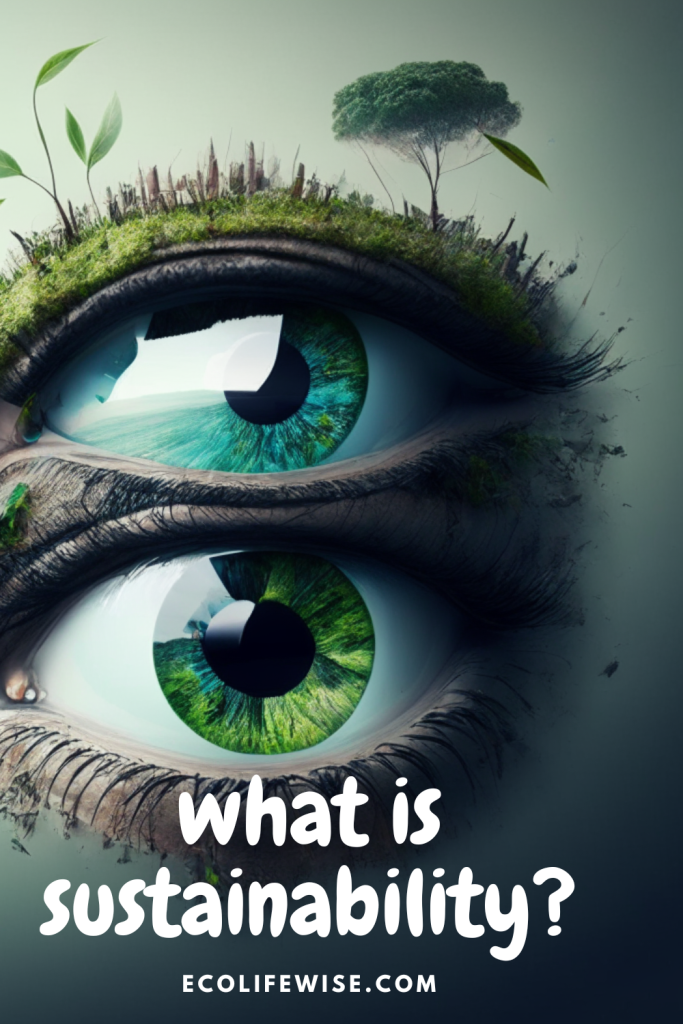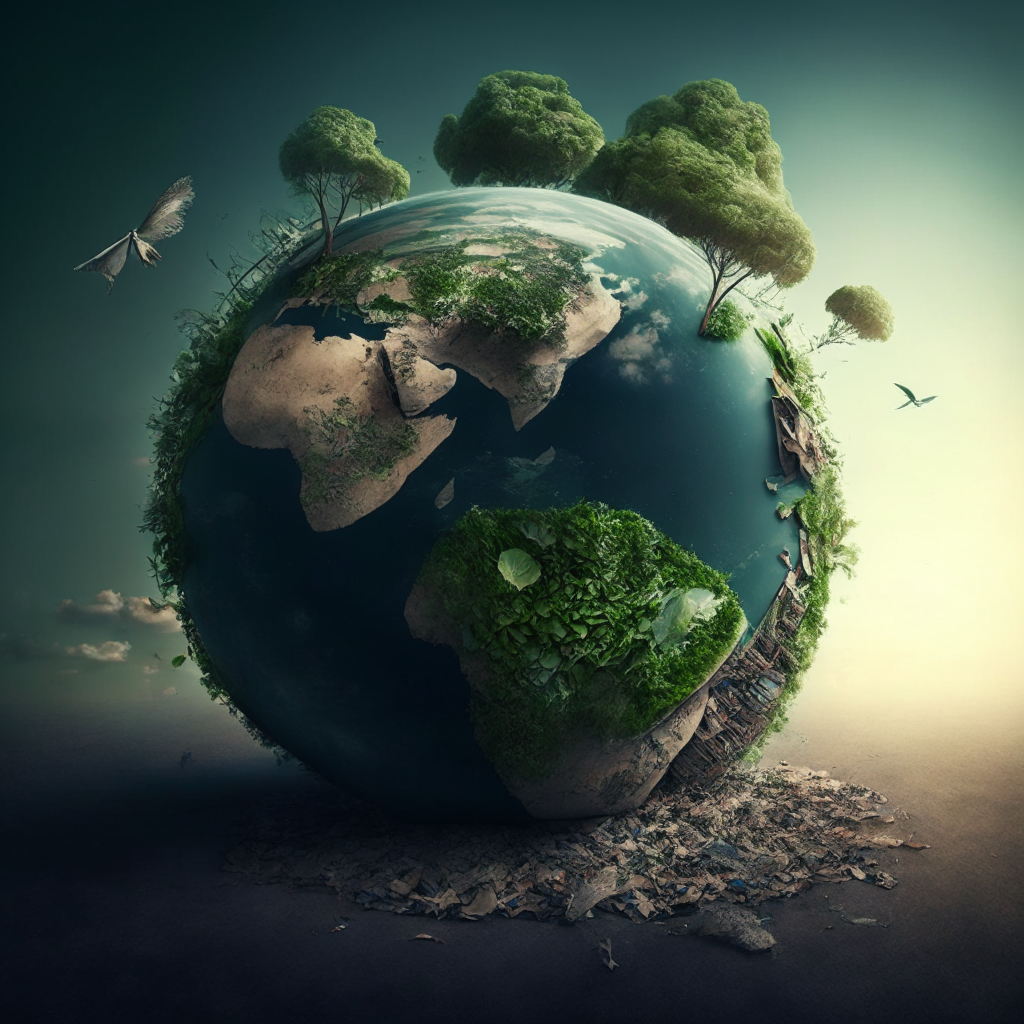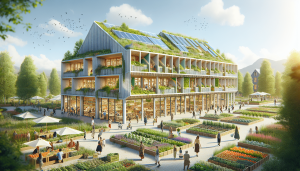Introduction: What is Sustainability in the Modern World?
As an enthusiast and advisor, I have come to appreciate the significance of sustainability in our modern world. So, what is sustainability? It’s not just a buzzword or a passing trend; it’s a vital concept that holds the key to our future well-being. In this article, we’ll delve into the essence of sustainability, explore its importance, and discuss how we can all contribute to building a sustainable future.
Defining Sustainability
In a nutshell, sustainability is about meeting the present generation’s needs while not impinging on the ability of future generations to meet their own needs. It is a holistic approach that considers the interdependence of environmental, economic, and social factors. It requires balancing these three pillars to achieve long-term harmony, well-being, and biodiversity.
Importance of Sustainability
Sustainability is crucial for several reasons. First and foremost, it is essential to preserve our environment. As we face growing concerns such as climate change, deforestation, and pollution, sustainability offers solutions to mitigate these issues and protect our planet for future generations.
Secondly, sustainability is closely linked to economic stability and growth. By embracing sustainable practices, businesses can reduce costs, improve efficiency, and tap into emerging market opportunities. Sustainable economic development ensures the longevity of companies and promotes a more resilient global economy.
Lastly, sustainability encompasses social equity and well-being. It recognizes the importance of equal access to resources, education, healthcare, and basic needs. Sustainable development aims to create inclusive societies empowering individuals and uplifting communities, leaving no one behind.
What is Sustainability in the Environmental Context?
One crucial aspect of sustainability is environmental preservation. It involves safeguarding natural resources, reducing waste, and minimizing carbon footprint. Sustainable practices like conservation, recycling, and adopting renewable energy sources contribute to the health and longevity of our ecosystems.
Addressing climate change is a vital component of environmental sustainability. By transitioning to clean energy sources and, at the same time, reducing greenhouse gas emissions, we can mitigate the adverse effects of climate change and work towards a more sustainable future.
Economic Sustainability: A Pillar of What is Sustainability
Sustainability and economic prosperity go hand in hand. It involves balancing economic growth with responsible resource consumption. Eco friendly companies can enhance their competitiveness, reduce costs, and build brand value.
Integrating sustainability into business models through initiatives such as green procurement, energy efficiency, and waste reduction benefits the environment and offers long-term economic advantages. Sustainable businesses are better positioned to adapt to changing market demands, attract environmentally conscious consumers, and secure long-term success.
Social Sustainability: Another Dimension of What is Sustainability
Social sustainability focuses on creating fair and inclusive societies, but what is sustainability in a social context? It encompasses principles of social justice, equality, and human rights. Sustainable development, as a component of what is sustainability, aims to ensure all individuals have access to education, healthcare, and basic necessities, regardless of their background or circumstances.
By embracing social sustainability, we can empower marginalized communities, promote gender equality, and foster social cohesion. It involves recognizing and addressing systemic inequalities and working towards a society where everyone can thrive and reach their full potential.
Sustainable Development Goals
A comprehensive roadmap for achievement on a global scale is provided by The United Nations’ Sustainable Development Goals (SDGs). The 17 interconnected goals address various challenges, including poverty, hunger, education, climate action, etc.
Each SDG highlights specific targets and indicators to measure progress. Individuals, organizations, and governments all play a crucial role in working towards these goals through advocacy, policy changes, or implementing sustainable practices in their daily lives.
Steps to Achieve Sustainability
These require collective action and a multi-faceted approach. Here are some critical steps that individuals, businesses, and governments can take:
- Raising awareness and education: Awareness of sustainability and its importance is crucial. Education is vital in shaping mindsets and inspiring action toward sustainable practices.
- Implementing sustainable policies and regulations: Governments have a significant role in creating enforceable policies and regulations that incentivize and support sustainability. This can include measures like promoting renewable energy, setting emission standards, and supporting sustainable agriculture practices.
- Collaborating and engaging stakeholders: Collaboration between various stakeholders, including businesses, governments, NGOs, and communities, is essential for driving sustainable change. Building partnerships and engaging stakeholders in decision-making can lead to more effective and inclusive sustainability initiatives.
- Investing in research and innovation: Continued investment in research and innovation is critical for developing sustainable technologies and solutions. This includes advancements in renewable energy, eco-friendly materials, and sustainable agricultural practices.
- Encouraging sustainable practices in daily life: Individuals can make a significant impact by adopting sustainable habits in their daily lives. This can include conserving water and energy, reducing waste, using public transportation, electric vehicles, or carpooling, and supporting local and sustainable businesses.
Sustainable Practices in Daily Life
Implementing sustainable practices in our daily lives is a powerful way to contribute to sustainability. We can:
- Reduce, reuse, and recycle: Embrace the three R’s of sustainability. Reduce waste by avoiding single-use items and opting for reusable alternatives. Reuse items when possible, and recycle materials that can be processed into new products.
- Conserve water and energy: Be mindful of water and energy consumption. Turn off lights and appliances when not in use, fix leaks promptly, and consider energy-efficient appliances and fixtures. Opt for water-saving techniques like collecting rainwater and using it for gardening.
- Choose sustainable transportation: Opt for public transportation, carpooling, biking, or walking whenever possible. If you need to Consider carpooling or using electric or hybrid vehicles if you need to drive.
- Support sustainable food choices: Choose locally sourced and organic produce when available. Reduce meat consumption or consider embracing vegetarian or vegan options, as animal agriculture contributes significantly to greenhouse gas emissions.
- Practice mindful consumerism: Consider the environmental and social impacts of your purchases. Support brands and businesses prioritizing sustainability, fair trade, and ethical practices. Choose quality products that are durable and repairable rather than disposable.
Sustainable Business Strategies
Businesses have an integral role to play in driving sustainability. Here are some strategies they can adopt:
- Incorporate sustainability into business models: Integrate sustainability principles into core business strategies and decision-making processes. This can include setting sustainability goals, incorporating environmental and social considerations into product development, and adopting circular economy practices.
- Green procurement and supply chain management: Opt for suppliers and partners that align with sustainable practices. Consider ethical sourcing, environmental impact, and fair labor practices when making procurement decisions.
- Embrace corporate social responsibility (CSR): Implement CSR initiatives that address social and environmental issues. This can include supporting local communities, donating to environmental causes, and engaging in volunteer programs.
- Reduce waste and improve resource efficiency: Implement waste reduction strategies, such as recycling programs and waste-to-energy initiatives. Optimize resource use by implementing energy-efficient technologies and promoting water conservation measures.
- Engage employees and stakeholders: Foster a culture of sustainability within the organization by involving employees in sustainability initiatives. Encourage their ideas and provide training and awareness programs to empower them to contribute to sustainability goals.
Benefits of Embracing Sustainability
Embracing sustainability offers numerous benefits for individuals, businesses, and society as a whole:
- Environmental benefits: By adopting sustainable practices, we can preserve ecosystems, protect biodiversity, reduce pollution, and mitigate climate change. This leads to cleaner air, water and a healthier planet for future generations.
- Economic benefits: Sustainability can result in long-term cost savings and create new economic opportunities. Businesses that embrace sustainability often experience increased efficiency, reduced waste, and access to growing markets focused on eco-friendly products and services.
- Social benefits: Embracing sustainability promotes social equity and well-being. It helps create inclusive societies with equal access to resources, education, healthcare, and growth opportunities. Best practices empower marginalized communities and promote social justice.
- Brand reputation and customer loyalty: Consumers increasingly demand sustainable products and services. By embracing sustainability, businesses can enhance their brand reputation, attract environmentally conscious customers, and build long-term customer loyalty.
- Resilience and future-proofing: Sustainability helps businesses and communities become more resilient to environmental and social changes. Companies can adapt to evolving market demands, regulatory requirements, and consumer preferences by adopting sustainable practices. This ensures their long-term viability and success in a changing world.
Challenges in Achieving Sustainability: What Hinders Us From Fully Realizing What is Sustainability?
While the benefits are clear, some challenges must be overcome:
- Resistance to change: Embracing sustainability often requires significant changes in mindset, practices, and infrastructure. Overcoming resistance to change, both on an individual and organizational level can be a challenge.
- Balancing short-term and long-term interests: Short-term economic priorities sometimes overshadow long-term sustainability goals. Striking a balance between immediate economic concerns and long-term environmental and social considerations is essential.
- Complexity and interdependence: Challenges are often complex and interconnected. Addressing one aspect may have unintended consequences in another area. Understanding these interdependencies and finding integrated solutions can be challenging.
- Political will and policy frameworks: Effective sustainability requires strong political will and supportive policy frameworks. However, political dynamics and competing interests can hinder the development and implementation of policies.
- Lack of awareness and education: Many individuals and businesses may need to fully understand the importance of sustainability or know how to take actionable steps. Raising awareness and providing education is crucial to overcoming this challenge.
Conclusion
Sustainability is an abstract concept and a critical pathway to a better future. We can create an ecologically balanced, economically prosperous, and socially just world by addressing environmental, economic, and social considerations. Individuals, businesses, and governments all have a role in achieving this goal. Let us embrace sustainable practices, collaborate across sectors, and work towards a future where the needs of present and future generations are met harmoniously.
FAQs
Why is sustainability important?
Sustainability is important because it ensures our planet’s and future generations’ well-being. So, what is sustainability in this context? It addresses pressing issues such as climate change, resource depletion, and social inequalities, working towards a more balanced and equitable world.
How can I contribute to sustainability in my daily life?
You can contribute in various ways. Adopt sustainable habits like reducing waste, conserving energy and water, choosing eco-friendly products, and supporting sustainable businesses. Every small action counts.
What are some sustainable business practices?
These business practices can include:
- Implementing green procurement.
- Reducing waste.
- Embracing renewable energy sources.
- Adopting circular economy principles.
- Integrating social and environmental considerations into business strategies.
What are the biggest challenges?
The challenges include:
- Resistance to change.
- Balancing short-term and long-term interests.
- Addressing complex interdependencies.
- Ensuring supportive policy frameworks.
- Promoting awareness and education.
How do sustainable development goals help in promoting sustainability?
Sustainable Development Goals (SDGs) provide a comprehensive framework and targets to guide global efforts. They address critical issues like poverty, education, climate action, and gender equality, helping to drive progress and collaboration towards a sustainable future.






Pingback: Recycled Shoes: A Step Towards a Sustainable Future
Pingback: Sustainable Agriculture: A Green Revolution - Eco Life Wise
Pingback: How to Make Compost: A Guide to a Greener Garden - Eco Life Wise
Pingback: Sustainable Bedding: The Ultimate Guide - Eco Life Wise
Pingback: Sustainable Fish: Safeguarding Our Oceans' Future - Eco Life Wise
Pingback: Sustainable Shoe Brands: A Step Towards a Greener Future - Eco Life Wise
Pingback: Eco Friendly Laundry Detergent: Why and How to Make the Switch - Eco Life Wise
Pingback: Goodwill Recycling: Transforming Lives and Our Planet - Eco Life Wise
Pingback: Facts About Solar Energy: Harnessing the Sun's Power - Eco Life Wise
Pingback: Eco Friendly Phone Cases: Smart For a Sustainable Lifestyle
Pingback: Solar Battery: The Future of Sustainable Energy - Eco Life Wise
Pingback: Compost Spreader: You and Your Garden's Best Friend
Pingback: Recycled Art: An Eco Friendly Approach to Creativity
Pingback: Navigating the World of Sustainable Clothing Brands
Pingback: Benefits of Recycling: Maximizing Your Impact for a Greener Planet
Pingback: Facts About Recycling: Conserving Resources & Building Sustainability
Pingback: Upcycling: 10 Things You Probably Didn't Know - Eco Life Wise
Pingback: Is Cardboard Recyclable? You Might Be Surprised - Eco Life Wise
Pingback: Organic Basics: The Untamed Journey of Green Living
Pingback: Why is Recycling Important? A Definitive Guide | Eco Life Wise
Pingback: How Does Climate Change Affect the Ocean? | Eco Life Wise
Pingback: History of Recycling: A Journey From Trash to Treasure
Pingback: Why are Natural Resources Important? Discover Earth's Treasures
Pingback: Benefits of Organic Apple Cider Vinegar: An Indepth Guide
Pingback: Climate Change Facts for Kids: A Cool Guide for a Hot Topic | Eco Life Wise
Pingback: Benefits of Renewable Energy: The Future is Bright (and Windy!) | Eco Life Wise
Pingback: Self Sustainable Homes: 7 Practical Reasons Why You Need One Today! | Eco Life Wise
Pingback: How Do Electric Cars Help The Environment? 7 Practical Points to Ponder | Eco Life Wise
Pingback: Contamination in Composting Streams: 5 Revealing Factors | Eco Life Wise
Pingback: How Do Wind Turbines Generate Electricity? | Eco Life Wise
Pingback: Time to Shine Makers Make It Work Paperback Review: 10 Interesting Facts | Eco Life Wise